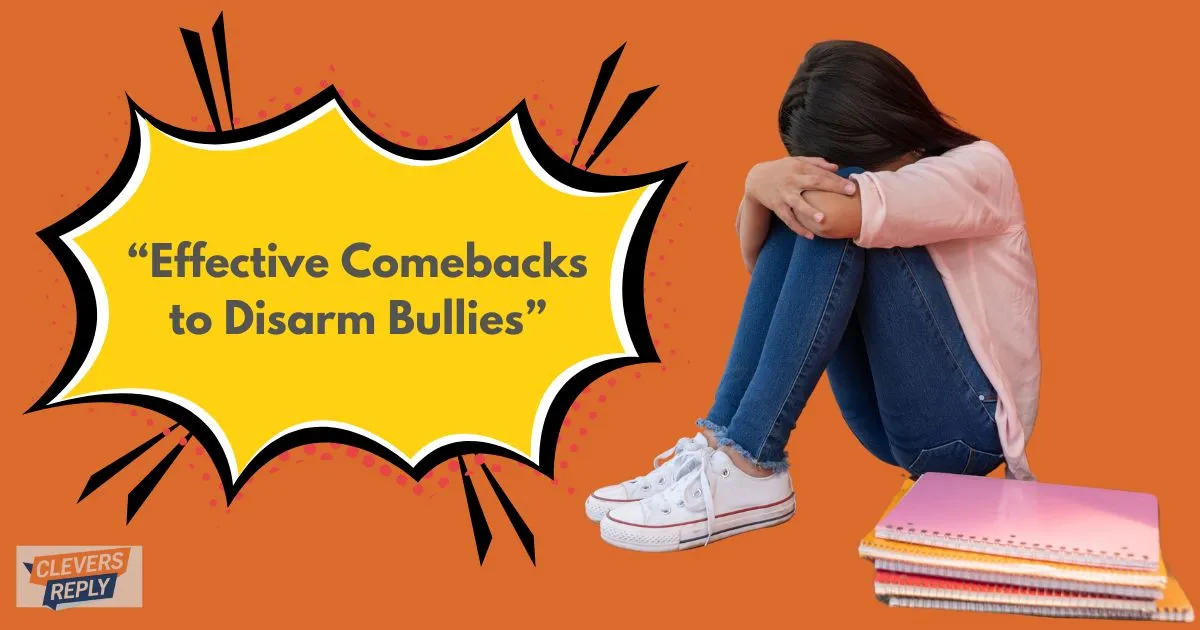““Words can hurt, but the right comeback can protect your confidence.”
Bullying can shake anyone’s confidence, but the right words can empower you. Whether it’s verbal, emotional, or online, bullying leaves a lasting impact if unchecked. Learning effective comebacks not only helps you handle tough situations but also rebuilds self-esteem. Remember, standing up for yourself doesn’t mean fighting fire with fire—it’s about maintaining your dignity.
If you’ve ever struggled to find the right thing to say, this guide is for you. It’s packed with clever, calm, and powerful responses to put bullies in their place. With these tools, you’ll feel more prepared the next time you encounter negativity. It’s time to reclaim your power with words.
Ready to boost your confidence? Let’s dive into practical tips and examples to help you navigate bullying effectively. With categories ranging from boundary-setting to witty comebacks, you’ll find strategies tailored to every situation.
Ways to Set Boundaries
- “Stop right there. That’s not okay.”
- “I don’t appreciate your tone.”
- “I’m not engaging with this behavior.”
- “This conversation is over if you keep talking like that.”
- “You’re crossing a line, and I won’t tolerate it.”
- “You don’t have the right to treat me this way.”
- “I respect myself too much to listen to this.”
- “Please don’t speak to me like that.”
- “Your opinion doesn’t define me.”
- “Let’s keep this professional and respectful.”
- “I don’t owe you any explanation.”
- “This isn’t funny; stop.”
- “Boundaries matter. Respect mine.”
- “I won’t argue with you. I know my worth.”
- “Find someone else to pick on. I’m not the one.”
- “You need to think about how your words affect others.”
- “Enough. This ends now.”
- “You’re out of line, and I’m done here.”
- “This isn’t acceptable behavior.”
- “Talk to me respectfully, or don’t talk at all.”
Ways to Reflect on the Insult
- “Wow, that’s creative. Did you practice that one?”
- “Is that really the best you’ve got?”
- “Why do you feel the need to say that?”
- “Interesting perspective. Not sure it’s accurate, though.”
- “That says more about you than it does about me.”
- “Are you okay? You seem upset.”

- “If you’re trying to upset me, it’s not working.”
- “What exactly are you trying to achieve with that comment?”
- “You might want to think about why you’re saying this.”
- “Thanks for sharing. I’ll let that one go.”
Calm and Confident Ways to Respond
- “Your words don’t affect me.”
- “I’m not interested in this conversation.”
- “That’s enough. Let’s move on.”
- “I know who I am, and this doesn’t bother me.”
- “I choose not to take this personally.”
- “Your opinion isn’t my reality.”
- “Thanks for your input. Have a great day.”
- “I don’t engage in negativity.”
- “Let’s agree to disagree.”
- “I won’t dignify that with a response.”
Ways to Point Out Insecurities
- “You seem to be projecting your issues onto me.”
- “Is there something going on that’s making you act this way?”
- “What are you trying to hide by putting me down?”
- “It’s interesting how you point out flaws in others.”
- “Your need to criticize says more about you than me.”
- “What’s really bothering you today?”
- “I hope tearing me down helps you feel better.”
- “Are you feeling okay? You’re acting unusual.”
- “Insecurity isn’t a good look on anyone.”
- “I’d rather lift others up than tear them down.”
Clever & Witty Comebacks
- “Thanks for your opinion. I didn’t ask for it.”
- “Oh, you must be the expert on that!”
- “You’ve got jokes, but no facts.”
- “I didn’t know you were my biggest fan.”
- “That’s cute. Are you done?”
- “You must practice those lines in the mirror.”
- “I’d agree with you, but we’d both be wrong.”
- “Do you feel smarter after saying that?”
- “Wow, groundbreaking stuff. Got more?”
- “You’ve got opinions, but no audience.”
- “Was that supposed to hurt? Try harder.”
- “That’s a lot of effort for no reaction.”
- “I’d clap, but I’m too busy being unbothered.”
- “Good one. Did you Google that insult?”
- “I hope this performance is worth it for you.”
“Clever Comebacks: How to Avoid Unwanted Questions“
Disarming with Empathy & Kindness
- “I’m sorry you feel that way.”
- “I hope your day gets better.”
- “You seem upset. Can I help?”
- “What’s really going on with you?”
- “I’m here if you need someone to talk to.”
- “It sounds like you’re having a rough day.”
- “I know this isn’t really about me.”
- “Are you okay? You don’t seem yourself.”
- “I forgive you for saying that.”
- “We all make mistakes. It’s okay.”
Ways to Question & Redirect Focus
- “Why do you think this is appropriate?”
- “What’s your goal in saying this?”
- “Do you always talk to people like this?”
- “What would your best friend think of this?”
- “Do you feel proud of that comment?”
- “What are you hoping to achieve here?”
- “Does this behavior make you happy?”

- “Would you say this to your family?”
- “Why don’t we focus on something productive?”
- “How would you feel if someone said that to you?”
- “Is this really the kind of person you want to be?”
- “What’s going on in your life that’s making you act like this?”
- “Do you think this will make you feel better in the long run?”
- “What’s the real issue here?”
- “Can we talk about something meaningful instead?”
Tips for Handling Bullies
- Stay calm and composed. Don’t let their words show on your face.
- Practice your responses in advance for extra confidence.
- Walk away if the situation escalates—it’s okay to prioritize your safety.
- Lean on friends or family for support when you need it.
- Focus on self-care to rebuild your inner strength.
Answer To Key Question
Q1: How can I stop feeling hurt by bullying?
A1: Focus on your strengths, seek support from loved ones, and use comebacks that empower your confidence.
Q2: Should I always respond to bullies?
A2: No. Sometimes, walking away is the strongest response you can give.
Q3: How can I practice clever comebacks?
A3: Role-play with a friend or in front of a mirror. Preparation builds confidence.
Q4: Can kindness really stop a bully?
A4: Yes, in some cases. Kindness can disarm bullies and make them rethink their actions.
Q5: What if I can’t think of anything to say?
A5: That’s okay. Silence and a confident exit are powerful responses too.
Final Thoughts
Handling bullies is never easy, but your words hold power. By setting boundaries, reflecting confidence, and staying composed, you can turn the tables and shift the power back in your favor.
Effective comebacks aren’t just about fighting back with words—they’re about preserving your dignity, maintaining control, and setting a clear standard of respect. When you handle bullying with grace and strength, you demonstrate that you’re not someone to be intimidated or belittled.
In the end, it’s not the bullies who define your worth, but how you respond to them. Choose to rise above their negativity with responses that reflect your own self-respect. Remember, it’s not always about winning the argument—sometimes, it’s about knowing your value and refusing to let anyone undermine it. Armed with the right comebacks, you’ll be ready to face any situation with calmness, confidence, and strength.

Hi! I’m Jane Austen, the administrator of Cleversreply.com. I’m dedicated to providing thoughtful and professional responses, ensuring that every message conveys gratitude and warmth with elegance.

